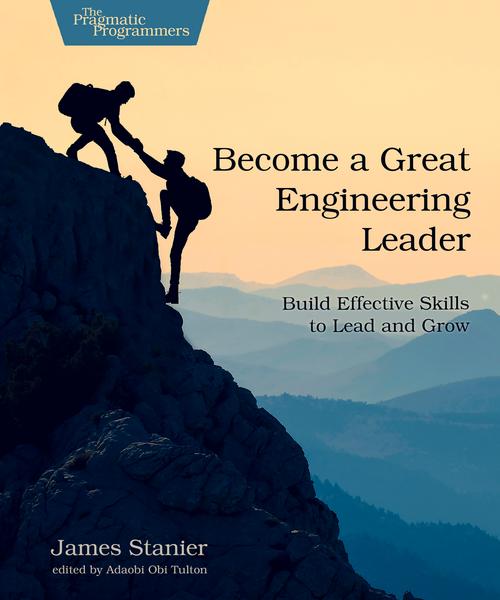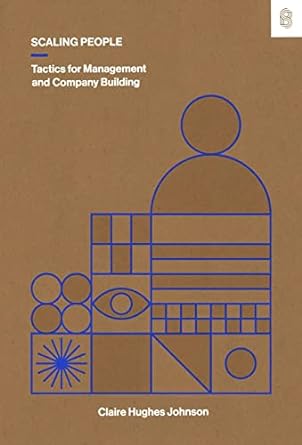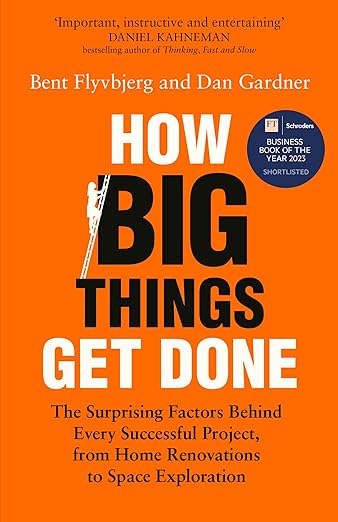3 Books for New Engineering Leaders
A shortlist for software engineers moving into engineering management and leadership
It's almost the end of 2024, making it a good time to reflect on the past year. The biggest change, for me, was taking on a new role as director of engineering at CloudQuery. Coming from a staff software engineering role, then team lead, and now organizational lead, I suspected it would be a mistake to treat this new role as just another day as a software engineer. The skills I had built up on the Individual Contributor (IC) track wouldn't all translate to the new responsibilities that come with this role. And hang on, what even were my responsibilities now? I would need to do a lot of learning and growing, and not in the technical way of learning new technologies that I was used to. This was—I'll freely admit—scary. But it was also an exciting opportunity, and I decided to approach it as such.
Over the last couple of months I have read as much as I can about engineering leadership, and in this post I wanted to share with you a few of the books I found most useful, with great advice I could put into practice almost immediately. Whether you are thinking about making the transition from IC to engineering manager, from engineering manager to director of engineering, from director to VP of engineering or CTO, or even if you are an experienced engineering leader, there are lots of valuable insights packed into all these books.
1. Become a Great Engineering Leader - Build Effective Skills to Lead and Grow
by James Stanier
 This book is excellent, and I was very lucky to have picked it up first. It is very pragmatic. It first explains how the different roles are defined ("VP, Director, What?") and the responsibilities that come with them. Then it moves on to practical tools and techniques for your day-to-day, and finally to strategy, planning and execution. I first read this in the weekend leading up to my first day in the role, and by following the advice, I often felt a few steps ahead, which was great.
This book is excellent, and I was very lucky to have picked it up first. It is very pragmatic. It first explains how the different roles are defined ("VP, Director, What?") and the responsibilities that come with them. Then it moves on to practical tools and techniques for your day-to-day, and finally to strategy, planning and execution. I first read this in the weekend leading up to my first day in the role, and by following the advice, I often felt a few steps ahead, which was great.
If you've been in an engineering leadership role for a long time and are doing well in it, perhaps most of the advice in this book will not be new to you, but there should still be some ideas you can apply. The book frequently references other popular business books and briefly summarizes the key ideas (books like Team Topologies and Finite and Infinite Games), so it can also be a good entrypoint for further topics to explore.
I still return to this book frequently.
2. Scaling People - Tactics for Management and Company Building
by Claire Hughes Johnson
 On a scale of pragmatism to idealism, if Become a Great Engineering Leader is all the way on the pragmatic side, Scaling People would be further towards the idealistic side. Perhaps this is not quite fair: Scaling People also comes with lots of practical, tactical advice. But the advice and wisdom is buried far deeper inside stories and anecdotes than is the case for Become a Great Engineering Leader. This made Scaling People a book that was a bit harder to get into, and one that is probably more worthwhile from a longer term perspective. It also comes with checklists and worksheets to help you on your journey.
On a scale of pragmatism to idealism, if Become a Great Engineering Leader is all the way on the pragmatic side, Scaling People would be further towards the idealistic side. Perhaps this is not quite fair: Scaling People also comes with lots of practical, tactical advice. But the advice and wisdom is buried far deeper inside stories and anecdotes than is the case for Become a Great Engineering Leader. This made Scaling People a book that was a bit harder to get into, and one that is probably more worthwhile from a longer term perspective. It also comes with checklists and worksheets to help you on your journey.
The author, Claire Hughes Johnson, is an accomplished leader of some of the biggest, most successful software teams. First at Google, then later at Stripe. This is probably also what made the book feel less pragmatic to me, someone at an earlier stage company. But there are still plenty of good lessons for leaders at all scales. I was able to apply a lot of the advice about hiring in the last few months.
The last thing I'll say about this--something I didn't realize at the time of purchase--is that this book is published by Stripe Press. Yes, a publishing arm owned by the very same Stripe the author works at. The result is, unfortunately, that many sections of the book, however well-intentioned, read like sales material trying to convince the reader to join Stripe. I didn't count exactly, but roughly half the book is dedicated to sections laying out Stripe's values, documents and history.
3. How Big Things Get Done - The Surprising Factors Behind Every Successful Project, from Home Renovations to Space Exploration
by Professor Bent Flyvbjerg, Dan Gardner
 By my own criteria from a blog post 6 years ago, I probably shouldn't have picked up this book, as it includes the word "surprising" on the cover. But I listened to this book in audio format, and so I didn't see its cover, and at least it did well on the other two criteria, by having generally great reviews and being written by an expert in the field. And it just goes to show, heuristics are just that: heuristics! I'm glad I picked it up.
By my own criteria from a blog post 6 years ago, I probably shouldn't have picked up this book, as it includes the word "surprising" on the cover. But I listened to this book in audio format, and so I didn't see its cover, and at least it did well on the other two criteria, by having generally great reviews and being written by an expert in the field. And it just goes to show, heuristics are just that: heuristics! I'm glad I picked it up.
This book is not as directly applicable to engineering management as the previous two on the list, but my main take-away from it is in how to better estimate how long complex projects will take: a critical skill for any engineering manager who needs to negotiate and communicate this with other parts of the business.
A very natural mistake we often make when estimating how long projects will take is to think about all the individual tasks that make up the project, estimate how long each of those should take, and then add them up to guess how long the project should take overall. If we have some experience in project estimation, maybe we'll add a fudge factor, like 2x, to account of unknowns, or try to account for Hofstadter's law.
But the authors argue, quite persuasively, that a better approach is to use what is called reference-class forecasting (RCF), a framework initially developed by Daniel Kahneman and Amos Tversky (and won them the Nobel Prize in Economics, by the way). RFC is a fancy name for what is essentially the idea that you should look at previous projects of a similar class to estimate how long your project will take. You can then add or subtract some time based on any factors that make your project (or team) special or different. For example, if you are planning on adding customizable dashboards for your SaaS product, the best way to estimate how long that will take is to look at how long it took to add in other products, and then adjust from there. Now, this information is often hard to come by, and that's probably the fatal problem with this approach, but with some creativity, it can usually be done with some degree of accuracy, which is enough for decent forecasts.
Honorable Mentions
Supercommunicators
by Charles Duhigg
Supercommunicators explores the art and science of effective communication, revealing the strategies and techniques used by skilled conversationalists to navigate challenging topics, build connections, and guide decisions. Through real-world examples, the book uncovers how to turn difficult conversations into successful outcomes.
Good Strategy / Bad Strategy
by Richard Rumelt
The main message is that good strategy stems from a clear understanding (or hypothesis) of what the biggest problem is to solve, and coming up with a set of actions that will solve this problem. Good strategy amounts to more than simply setting ambitious goals or thinking positively.
Closing Thoughts
There are many more books that could have made this list; books like An Elegant Puzzle, The Manager's Path and The Engineering Executive's Primer, for example. I would also recommend these. At the end of the day, it's good to know where to start, but I believe it is just as important to read widely, both in categories directly applicable to your field and in those adjacent. Build a picture of the full spectrum of ideas, in order to form your own opinions.
There's already a long list of books on my reading list for 2025. Some of these include books that challenge how we think, explore new ways to lead, or dive into technical details that might not directly apply to my daily work but still spark fresh ideas. Reading broadly doesn't just expand your knowledge—it helps you see problems from new angles and come up with creative solutions. My 2025 reading list is already growing, and I’m excited to discover new insights that could shape how I work and grow in the coming year.